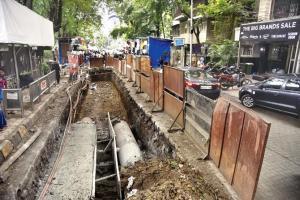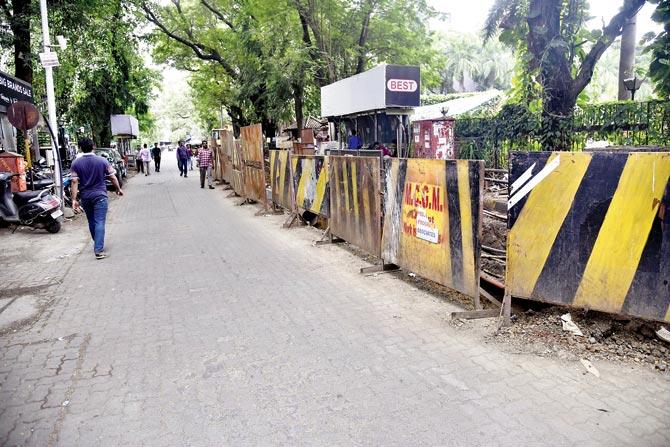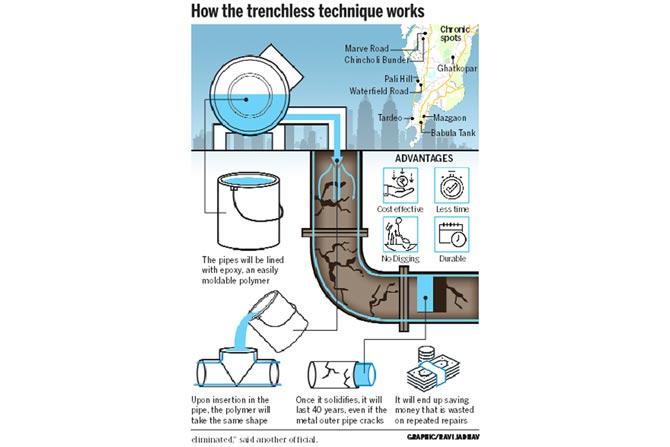BMC identifies nine spots with chronic leaks in the water mains; for the first time, to use a polymer to plug the fissures in a trenchless technique that will save money and time

Unlike the ongoing pipe repairs at Waterfield Road, the new trenchless technique will not leave the city's roads dug up. Pic/Pradeep Dhivar
For the first time, 'plastic' could be the answer to Mumbai's problems. The BMC has identified nine spots across the city where the main water pipelines experience chronic leakage despite repeated repairs. Instead of digging up the entire city yet again in search of the pesky leaks, the civic authorities have now decided to employ a trenchless technique and plug the holes with a polymeric material.

Half of Waterfield Road is cordoned off for pipe repairs, but this could soon be a thing of the past if the BMC pulls off trenchless rehabilitation successfully. Pic/Pradeep Dhivar
ADVERTISEMENT
The BMC blames plastic - just another term for polymers - for clogging drainpipes and causing waterlogging and potholes in the city. Now, the civic body intends to use a polymer called epoxy to resolve the same problems. Thanks to this material's moldable nature, the authorities will no longer have to dig trenches that run kilometres-long to repair the damaged pipelines (see 'How the trenchless technique works'). Not only will trenchless repairs cut the repair time by half - two weeks or less - but using epoxy to line the pipes will increase their life by 40 years. Officials have found fissures in 12 water mains that are decades old and have corroded with time and use. These leaks are spread across nine sites - three in the island city, four in the western suburbs and two in east.
Past repairs were pointless
A senior civic official from the BMC's water department said, "These water mains are very old and develop leaks from time to time. This damages the roads, leads to cave-ins, potholes and a lot of water wastage. Even if we do repair work, the leaks keep coming back, as these pipes are old."

Readers may recall that a burst pipeline was the cause of a cave-in at Marine Lines on June 25, just a day before PM Narendra Modi visited the city. At the time, the authorities had raced to finish repairs before the PM's visit, to no avail.
Wasteful methods
Even at the best of times, pipe repairs can be challenging because of the presence of roads or buildings above the surface, and often bear disappointing results. The official added, "For example, there is one water main at Waterfield Road, near Pali Hill in Bandra, which has frequent leakage. In the last two years, about 25 leaks were reported in that water main. Since this road is made of concrete, the water travels to weaker stretches and gushes out from there.
"In such cases, we use a trial-and-error method to identify the source of the leak. This means we have to start digging the road in the direction of the water's flow, and only after we find the hole can we repair it."
Unfortunately, this is why long stretches of our roads are dug up so often. A employee of the water department, who is associated with the project, said, "It is very difficult to dig and carry out repairs at such locations. It will take nearly a month to finish the job, as most pipelines are along the roads or below them. If we want to replace the pipelines, we will have to close the roads for nearly 20 days, which is practically impossible. So, trenchless rehabilitation of the water mains is the best way to do it."
Once the repairs are complete, the road is rarely restored to its original strength, as it is hard to lay concrete in small patches. "This leads to severe damage to cement roads, as well as waste of manpower. With the trenchless technology, waste of public money and manpower will be eliminated," said another official.
First time for water mains
The civic body has invited tenders worth Rs 36 crore for the rehabilitation and strengthening of the selected underground water mains using the novel technology. "Once the contractor is appointed, the work is supposed to be completed in eight months. The civic body is going to use this technology for the first time to repair the water mains. Trenchless technology is already used to mend the sewerage lines," said sources.
Officialspeak
Ashok Tawadia, chief
hydraulic engineer, BMC, said, "Rehabilitation and strengthening of these water mains are need of the hour, since there are frequent leaks. The water mains will be rehabilitated without affecting any other portion of road or structure with trenchless technology."
Also Read: Mumbai: Traffic Moves At Snail's Pace After Pipe Under Parel TT Bridge Bursts
Catch up on all the latest Mumbai news, crime news, current affairs, and also a complete guide on Mumbai from food to things to do and events across the city here. Also download the new mid-day Android and iOS apps to get latest updates
 Subscribe today by clicking the link and stay updated with the latest news!" Click here!
Subscribe today by clicking the link and stay updated with the latest news!" Click here!







